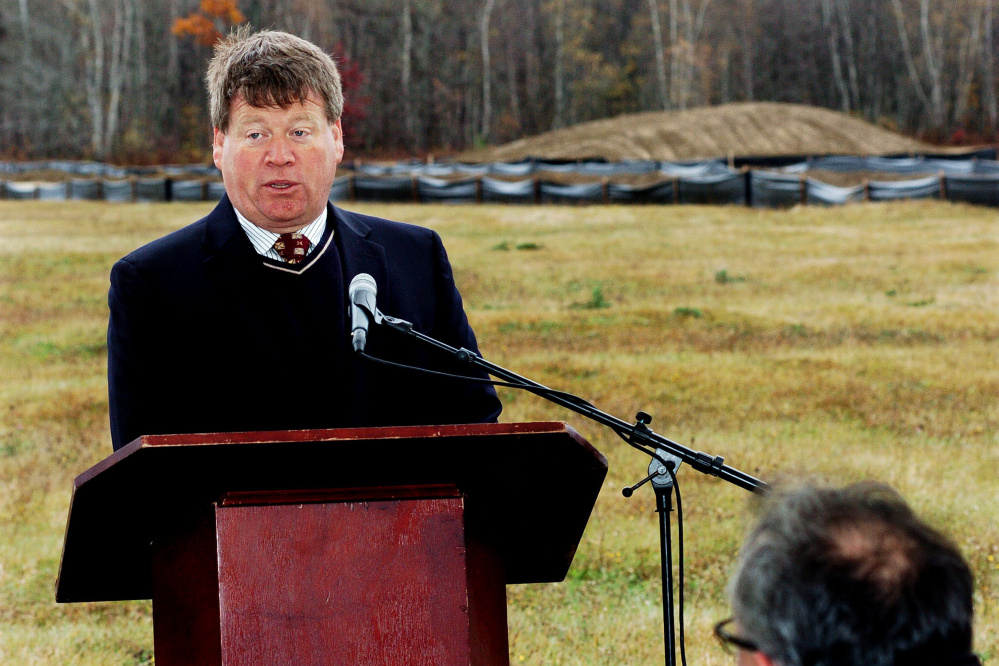A company working to build a first-of-its-kind waste management plant in Hampden has applied for a $45 million bond from the Finance Authority of Maine, a key step in the facility being built to serve the waste removal needs of many central Maine communities.
Maryland-based Fiberight would use the authority’s conduit bond as a “pass-through” to receive credit from investors while avoiding federal income taxes, according to Christopher Roney, general counsel for the authority. Investors would give money to the authority, which would pass it to Fiberight, but Fiberight would pay the investor back directly, so it would not affect the state’s credit.
The Finance Authority of Maine is the state’s quasi-independent agency that provides financing and education to local businesses. The authority, known as FAME, is holding a public hearing on the Fiberight application at 10 a.m. Monday at its offices in Augusta.
Fiberight is planning to have the $69 million solid waste facility ready by 2018, when a contract ends between the Municipal Review Committee, which currently represents 187 communities’ trash interests, and an Orrington-based plant.
More than 100 communities in Maine will stay with the committee and send their trash to Fiberight in Hampden, putting thousands of tons of waste and millions of dollars in tipping fee dollars annually into the effort.
The committee chose Fiberight as the financially viable alternative, as it offered a tipping fee of $70 per ton.
Those who sign a 15-year agreement with Orrington-based Penobscot Energy Recovery Co. will pay a tipping fee of $84.36 per ton after 2018, instead of nearly $90 per ton for those who sign a 10-year agreement, and all who have signed new contracts with PERC so far have taken the 15-year deal, according to spokesman Ted O’Meara.
However, Fiberight and the committee have hit roadblocks along the way, as PERC appealed state approval of the facility and a statewide environmental group balked at the state’s approval of the permits.
When permits were approved for the facility last year, critics continued to raise concerns about the relatively untested technology that will be used, a lack of specific information about the project’s financing, and whether the operation would be financially sustainable.
Meanwhile, construction of the road and utilities leading to the site of the proposed facility began late, and Fiberight has said it cannot reach financial closing until the appeal of the permit approval is settled.
At a groundbreaking ceremony in October, the Municipal Review Committee marked the conclusion of the deal with Fiberight, which included building the road to the proposed site and its infrastructure. The estimated cost, $5 million, will be paid using money from the tipping fee stabilization fund, which has more than $20 million. Construction is expected to continue through January and resume again in April 2017.
The plan calls for the Fiberight facility to be operational and accepting waste by April 2018.
In the application for the bond, Fiberight CEO Craig Stuart-Paul says, “Should the Project fail to qualify for conduit financing, Fiberight would likely proceed with the Project. However, the economic aspects of the Project would likely need to be revised. Without likely Authority financing, the Project would likely need to increase the tipping fee to the (committee), thereby reducing the value-add to the (committee’s municipal) members.”
In a phone interview Thursday, Stuart-Paul called the contract “inviolable,” saying Fiberight is obligated to uphold the contracted price, which is $70 per ton, to its member communities.
The increased tipping fees would be passed on to communities that have not made the decision to join the committee and send their trash to Fiberight, as well as commercial tonnage.
Both Casella and PERC have used authority financing as well, Stuart-Paul said, so this is a way of “leveling the playing field.”
Greg Lounder, executive director of the Municipal Review Committee, said that the contract provides no way to raise tip fees unilaterally, but that higher financing costs for Fiberight could affect “net costs” to communities if it’s unable to provide revenue sharing rebates built into the contract.
Madeline St. Amour — 861-9239
mstamour@centralmaine.com
Twitter: @madelinestamour
Send questions/comments to the editors.




Comments are no longer available on this story